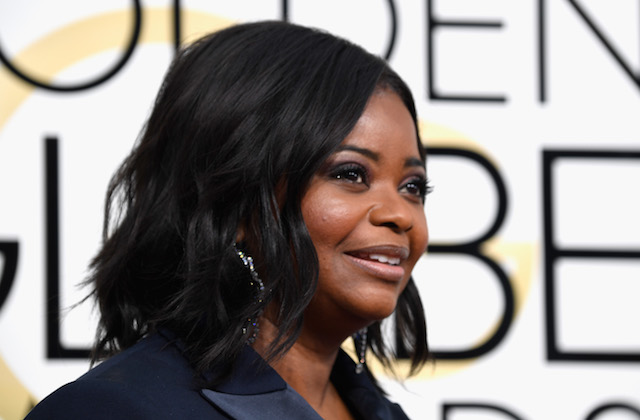Actress Octavia Spencer‘s current Oscar nomination for best "Actress in a Supporting Role" makes her part of, according to NBC News, the most racially diverse acting group in Oscar history. She explains in a Deadline Q&A published yesterday (February 14) that despite the increased recognition for films with stars and creators of color, some fundamental aspects of Hollywood racism remain unaddressed.
"The tide has changed, but we still have a ways to go, because [Hollywood gatekeepers] still aren’t inclined to greenlight a movie that’s starring a person of color, without a long list of White box-office people," says Spencer, who starts in "Hidden Figures." "Are we where we should be? No. We have some ground still to cover, but I’m optimistic because of the year we’re having."
Spencer also says that she doesn’t attribute the increase of nominated films starring people of color to the #OscarsSoWhite social media campaign, which first emerged in 2015 and returned in 2016 to criticize the industry’s marginalization of performers and filmmakers from underrepresented groups. Without specifying what she believes caused the change, Spencer goes on to describe her and other Black thespians’ future projects:
I know that I have projects coming up, and I know that Viola [Davis] and Taraji [P. Henson] have projects coming up. I know Idris Elba is headlining a few things, and I hope Mahershala Ali and André Holland and David Oyelowo have things coming up. And also, you know, I’m taking a more active role in producing, and so is Viola. I can’t see this year being an isolated thing, but then, I thought Hillary was going to be president, so I can’t tell you for sure.
She also elaborates on her vision of a more inclusive movie industry, and how she avoids films with predominantly White characters:
And when people say "diversity in Hollywood," they assume "Black," but diversity is all shapes and sizes, varying ages, varying backgrounds and socioeconomic levels, varying degrees of education, impoverished and elite. We see a lot of the elite, but very little of the impoverished that isn’t stereotypical. "Moonlight" is one of the few stories that cover what it’s like for the Black, gay experience. "Lion," that’s diverse, that’s out there now. There’s so many different perspectives and interesting stories out there. There are many, many meanings of diversity to me. I want to see more Latin stories told. More Asian stories.
I mean, when I look at the people that are underrepresented in the film industry, I’ve got to tell you, if I look down a list of characters on a film, and it doesn’t have gay, African-American or Latin characters, I’m probably not going to spend my money on the ticket. I’m going to be real honest with you. I see enough of the homogeneity, and I don’t need to support it with my dollar. And when we stop supporting things with our dollars that don’t represent all of us, then you’ll see an explosion of diversity.
"Hidden Figures" and "Moonlight" were both recognized with Oscar nominations this year. Spencer received her nod for portraying mathematician Dorothy Vaughan, one of three Black women whose work allowed NASA to send astronauts to space in the 1960s. Spencer says that she initially didn’t realize the "Hidden Figures" story was real:
I totally thought it was a work of fiction. When history obscured these women’s contributions, they were completely occluded from everything. You could go to NASA and find mentions in the archives, but Google it—which is what I did when I heard about it—and you didn’t find anything. I thought it was like [her previous film] "The Help"—historical fiction.
And then I was a little angry when I realized it was true. I felt compelled to be a part of it, because it was an idea whose time had come to be told. It was disbelief, and then a great sense of pride afterwards.
Read the full interview here.
